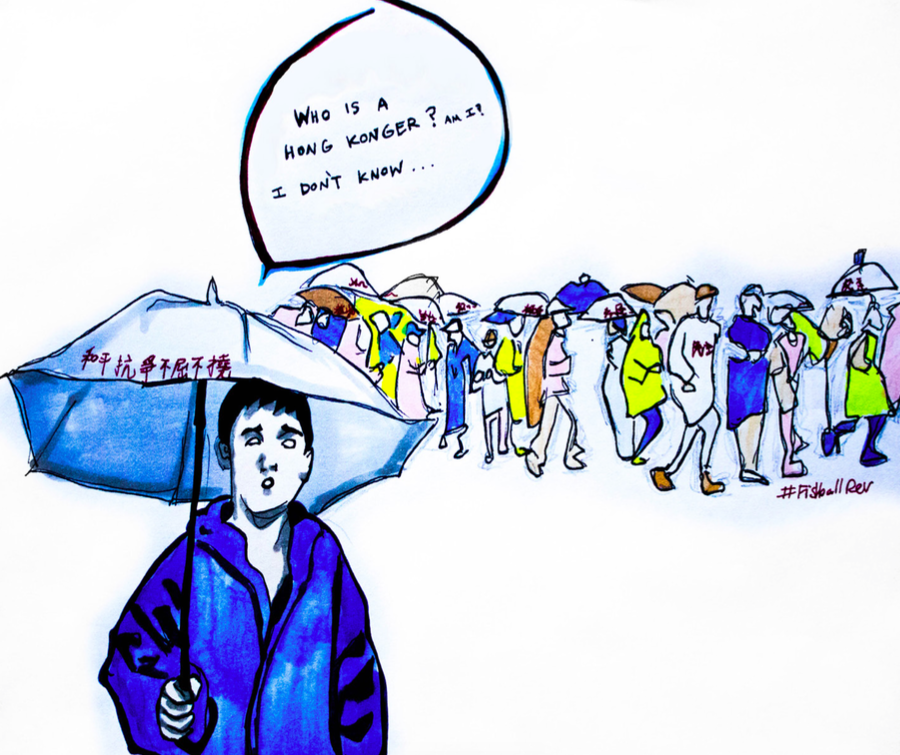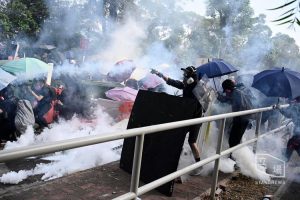The Lunar New Year is a time of fun and celebration in Hong Kong. Everyone suddenly becomes rich and fabulous; families gather around food, friends go to the massive, open-air flower market bazaars; children receive their annual income of red packets; and grandparents sit in front of the television to be lectured by fortune tellers.
This year was different. Last week, purportedly acting to defend the cultural artifact of street food, a group of demonstrators, rallied mostly through social media networks of people who want to defend “local” Hong Kong culture, violently fought with police officers throughout the night of the first day of the new year. In an online video that I will never forget, an injured police officer laid still on the concrete sidewalk, while a young man threw a large, orange trash can at him, epitomizing his blood-boiling anger at the representatives of a hated government that had long lost the trust of an entire generation. It made for astonishing television.

Sam Lee
It is easy to jump to the conclusion that Hong Kong’s political environment has become irrevocably toxic since the “Umbrella Movement” protests in 2014. That is partly true. The current government, led by Leung Chun-ying, has demonstrated again and again that it will seize upon every opportunity to curry favor to Xi Jinping rather than to actually act in the interests of the people of Hong Kong. In his latest policy address, akin to an American State of the Union, Leung decided to wax lyrical about China’s “One Belt, One Road” vision instead of responding to the international outcry over the mysterious disappearance of five employees of a bookstore selling books about scandals in the Chinese Communist Party. This was made worse by the fact that Hong Kong’s economy has little to do with the Central Asian countries involved in that project.
Often after I tell friends and acquaintances where “I come from,” they ask me if I think Hong Kong is a part of China. This is a silly question, because there is no doubt that the city is de jure part of China. But there are some things some people in this city treasure because they cannot find them anywhere else in China: the freedom to discuss and publish what you want in universities, the rule of law, the old tea restaurants with delicious noodles and milk tea run by cranky old ladies. Even if these things continue to persist to some extent in Hong Kong, the city’s government, with its ties to an elite and privileged class allied with those in power in Beijing, has consistently failed to inspire confidence in its potential to allow the continued thriving of what once made Hong Kong the “Pearl of the Orient”.
In recent years, a number of militant and activist political groups have spawned online, ostensibly to protect Hong Kong’s “local” values. They want to protect the privileged status of Cantonese. They want to drive out tourists and immigrants from mainland China. Nostalgic about British colonial rule, they wave the Union Jack around in protests and publish bestsellers about how Hong Kong should be a city-state. On the surface, their hopes and dreams connect directly with the disappointment of some of Hong Kong’s people and to the government’s policy failures. But it is worth pondering: what kind of Hong Kong do they really want?
If the price of gaining a Hong Kong identity is to master Cantonese and to look like a Hong Konger, then what of the tens of thousands of Hindu, Sikh, Nepalese, and Muslim immigrants who have been here since the 1840s, many of them illiterate in Chinese and in poverty? Or the hundreds of thousands of Filipinos, Indonesians, and Thai housekeepers who are deprived of labor rights and have to fight in court to seek damages for torture and malnourishment from their employers? And do they seriously want Hong Kong to return to the motherly arms of the British Empire because white old men can run the city better? How does one laugh at Donald Trump’s racist supporters, and then make the same reactionary and racist comments about “locusts” from mainland China?
The fundamental question remains: what does it mean to be a Hong Konger? Its inhabitants occupy a cosmopolitan place that has long been a symbol of progress and development, despite its gender discrimination in the workplace, a dearth of LGBTQ rights, and huge wealth inequality. But if a discriminatory and exclusionary Hong Kong is what these groups want to keep Hong Kong “local,” I want to have nothing to do with them. There is nothing to be proud of about a society dominated by these ugly, shameful, nativist organizations.
The tragedy is, the Chinese government will think that Hong Kong is growing restive and separatist. And the tragedy is, Leung Chun-ying will let China interfere more and more with Hong Kong’s affairs, further fanning the angry violence of these young, frustrated activists. Lather, rinse, and repeat.


